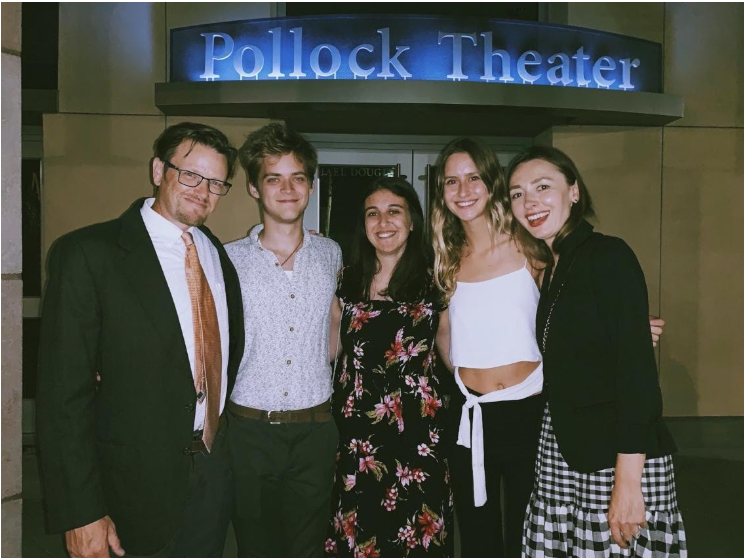By Jasmine Salik
Not many can boast their college debut film received two-major awards and continues to be screened at film festivals internationally. Even fewer can say they did it all in only short nine weeks. But UC Santa Barbara students Alexander Shuryepov and Mitchka Saberi have proven almost anything is possible.
Their short-feature film, Mother of Chernobyl, originally produced for UCSB’s GreenScreen program and released in the spring of 2019, was an official selection at the 2020 Santa Barbara International Film Festival. The GreenScreen Program, hosted by the Carsey-Wolf Center, offers students a chance to produce an environment-focused film, under the mentorship of filmmaker Chris Jenkins.
Mother of Chernobyl writer/director,Alexander Shuryepov and producer Mitchka Saberi, at the 2020 Santa Barbara International Film Festival in January.
Mother of Chernobyl takes place in 1987 Ukraine, a year after the devastating Chernobyl nuclear disaster. It follows the story of a woman named Masha who decides to stay in the radiation zone with her newborn baby. Masha must fight for herself and her family to survive amid unimaginable tragedy.
Writer and director Shuryepov and producer Saberi’s film has won two awards to date: the Gold Award for Student Film at the Hollywood Independent Filmmaker Awards and Festival, and Best Student Director (Male) at the Indie Short Fest Los Angeles International Film Festival. In addition to having screened at this year’s Santa Barbara film festival, Mother of Chernobyl has also been selected for the Russian International Horror Film Festival in Moscow in March. Both Shuryepov and Saberi plan to attend.
The official Mother of Chernobyl film poster.
Filmed entirely in Russian with English subtitles, and shot in black and white, Mother of Chernobyl has brought international recognition to GreenScreen films. This hands-on, project-based environmental media production program is offered exclusively to just 16 students selected during spring quarter. The goal is not only to increase awareness about the environment, but to expand the ways these issues are represented and communicated. GreenScreen brings together students in the arts, humanities, social sciences, and sciences.
Shuryepov and Saberi recently sat down for an interview with Humanities and Fine Arts to talk about their experience in the GreenScreen program and their film in more depth.
Q. Do you think your film achieves GreenScreen’s goal? What message do you want to deliver to your audience?
Alexander Shuryepov: Everyone can get their own message from the film, but my intent was to show a deeper and more personal part of Ukraine that most Western audiences haven’t seen with modern depictions of Chernobyl. When the idea first came to me, I never really thought of the film as a hazardous tale about environmental issues or a cautionary tale about nuclear safety. It was about an honest depiction of Ukrainian people that I had seen throughout my life. I’m happy the film was still able to serve the purpose of GreenScreen while also helping filmmakers in the class realize they’re not stuck making a documentary in English or about the United States, their films can be broader and more global than that.
Q. How did the GreenScreen program help you create your film?
Mitchka Saberi: GreenScreen is different than other production programs at schools like UCLA or USC. Those schools are very monitored. What we found at UCSB is that we were left to our own devices. This may have been difficult and frustrating in the beginning because neither of us had experience at this level of production before. But in the end, it forced us to figure out our own modes of production. At other schools where production is their primary emphasis, they care so much about making sure their films aren’t “bad” that they don’t let risks go through. We both feel as if the way this program is structured allowed us to make the film we did.
Q. What was the most important thing you learned during or after the filmmaking process?
Shuryepov: In high school I applied to various film schools like UCLA, USC, and Chapman and I got rejected from all of them. This film gave me confidence that the stories I want to tell are worth telling and I’m happy that UCSB was the school that saw that in me.
Q. What role do you think film and media have in the 21st century? What are your intentions for creating?
Saberi: I find that narrative film is really important in today’s world because so much of what we’ve all learned about is from movies we watch growing up. Storytelling and the things you imply through your films really change how people think, so it’s important to be responsible in the films you make and the messages they put out into the world.
Shuryepov: I participated in technical theater in high school, but I always had the urge to tell my own stories. Film gives me a chance to share emotions, personal experiences and perspectives I feel I can only do through filmmaking. With this film being as niche as it is, it’s comforting to think people want to see it and festivals want to show it. It makes me think of what other stories I want to share with the world.
The Mother of Chernobyl team at the 2019 end-of-the-quarter GreenScreen premiere at UCSB’s Pollock Theater. From left to right: GreenScreen instructor Chris Jenkins, writer/director Alexander Shuryepov, producer Mitchka Saberi, production manager Katelyn Zamudio, and lead actor Alyona Khmara.
Jasmine Salik is a fourth-year UC Santa Barbara student majoring in environmental studies with a concentration in environmental media.




